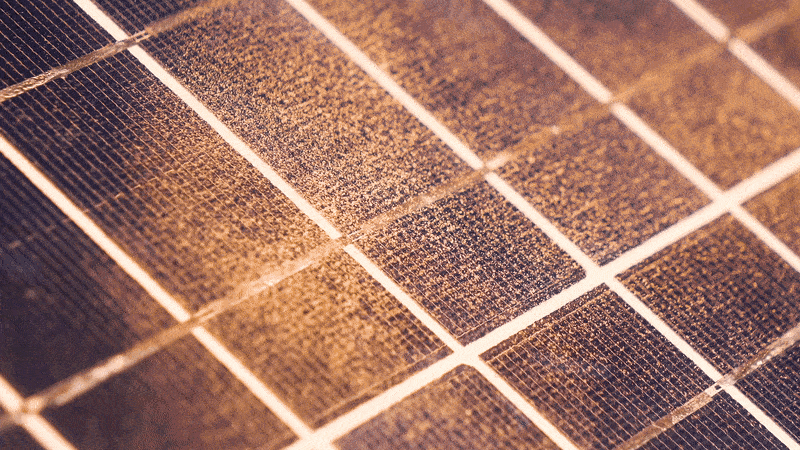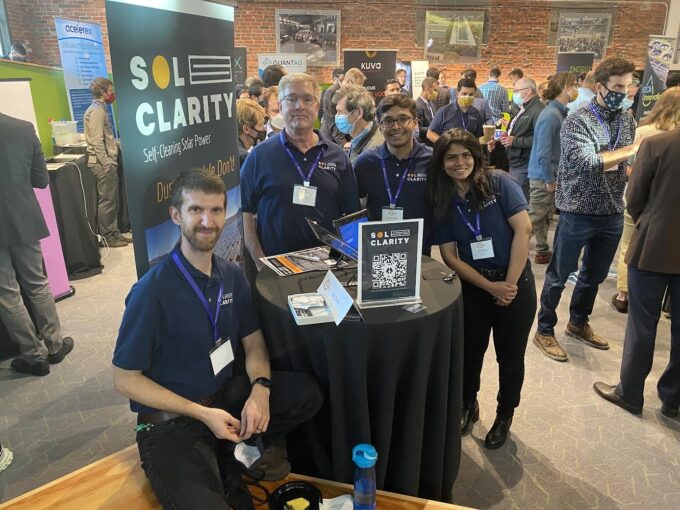“I come from India, the land of dusty solar panels,” says Malav Sukhadia. “At the same time, growing up I saw moms waiting in the scorching sun for water, which is rationed. This instilled in me the value of conserving resources and using them sustainably.”
Sukhadia is the head of growth and finance at Sol Clarity, a Greentown Labs startup with a dual mission: clearing solar panels of dust that can significantly reduce their power output, while saving massive quantities of water that are currently needed to conduct this cleaning.
Areas of the world where solar panel soiling is a major problem—sunny, arid regions including the Middle East and Sub-Saharan Africa—are also prime spots for solar energy deployment. In places such as these, panels need to be cleaned daily to maintain their maximum energy yield, but this is cost- and labor-prohibitive. According to Sol Clarity, dust can cut a solar plant’s power output in half in a year in these arid areas.

Sol Clarity’s Electrodynamic Screen (EDS) uses electric fields to remove dust from solar panels in under two minutes—a process that is water-free and labor-free. This transparent overlay can be used to retrofit existing panels, and in the future, the startup plans to explore integrating its technology into the manufacturing process as well.
If deployed at scale, the EDS could increase energy yield from the world’s solar panels by about 7 percent and save the roughly 14 billion liters of water that are currently used annually to clean panels, according to Sukhadia.
The startup’s initial target customers are commercial and industrial rooftop solar owners.
“Through customer interviews, we’ve learned how arduous it is for people to go up on their roofs and clean these panels, let alone the safety issues,” says Annie Bernard, CTO and co-founder of Sol Clarity. “It’s such a cumbersome task that no one does it as much as they should. But with the EDS, it’s literally just a flip of a switch.”
Sukhadia, Bernard, and Ryan Eriksen—the startup’s CEO and co-founder—met in a research lab at Boston University, where they worked on what would become Sol Clarity’s technology. The team spun out when the COVID-19 pandemic shut down their lab, so that they could continue their work.
The eight-person startup closed a $920k Seed I round in November 2022, and over the next year intends to conduct its first commercial pilot and complete its initial product. Sukhadia attributes the origins of both this funding and pilot to connections made at Greentown events; Sol Clarity’s team met Greentown partner Equinor Ventures at an EnergyBar networking event, and met their pilot partner at Greentown’s Climatetech Summit.
“I’m a Greentown fanboy,” Sukhadia says. “Most of the milestones Sol Clarity has reached today, Greentown has played a part in.”
Sol Clarity is also an avid user of Greentown’s prototyping lab, rooftop lab, and machine shop and an active member of the community.
“We’ve made a lot of use of the machine shop, and took advantage of the rooftop testing when we sent out our first prototypes,” Bernard says. “Greentown has literally all we need.”
“Being able to connect with other startups has been very valuable—everything from what payroll service they use, to what bank they have,” Eriksen says. “Things that would take me a lot of time and research to figure out, I can find out from peers what they’re doing. It accelerates how quickly we can move.”


